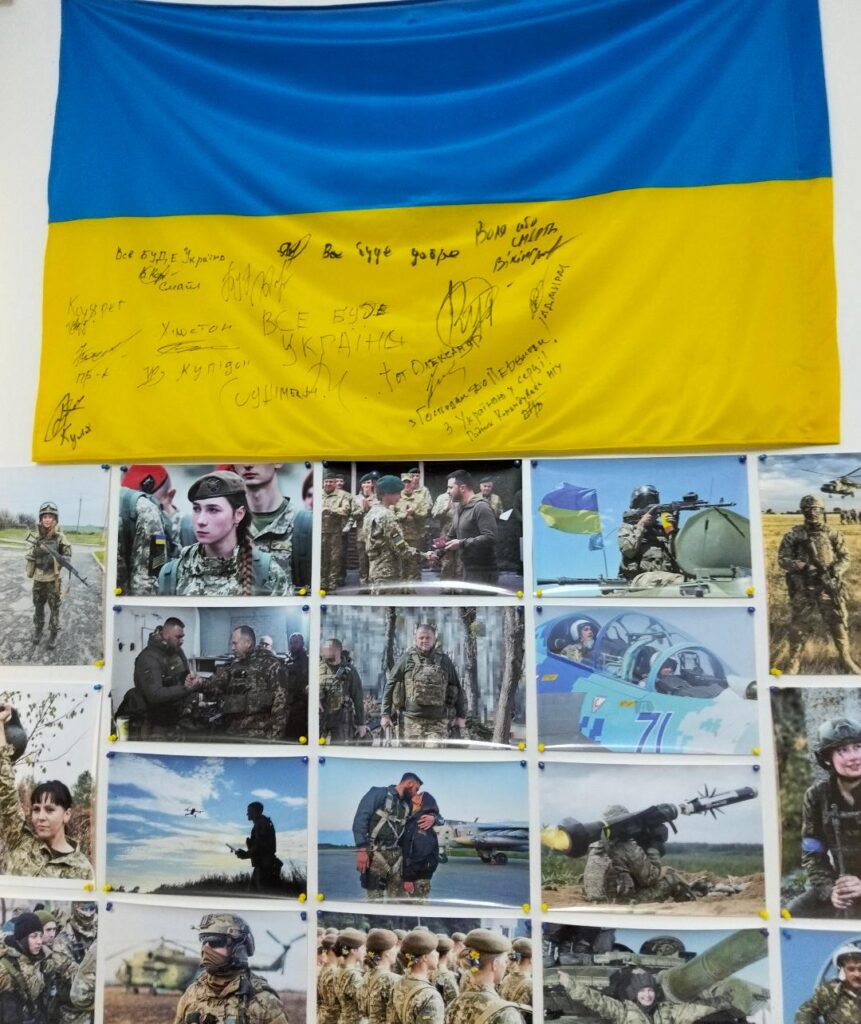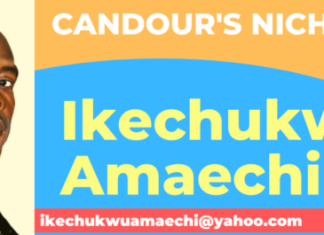Ambassador Ivan Kholostenko on the peace Ukrainians crave for: “Ukraine’s position on peace remains firm. Ukraine desires peace more than anyone does. Ukraine did not start this war and never wanted it. If Russia stops fighting – there will be peace. If Ukraine stops fighting – Ukraine will cease to exist.”
By Ikechukwu Amaechi
On Friday, December 6, Ukrainians commemorated their Armed Forces Day in honour of “brave defenders who protect their homeland from Russian aggression.” Ukrainian ambassador to Nigeria, Ivan Kholostenko, said the honourees “safeguard not only Ukraine but also the broader world.”
“On this day, we express our deepest gratitude to all those who defend the freedom and future of our country, ensuring peace and security for millions around the globe. The Embassy of Ukraine in Nigeria commemorates the heroes with an exhibition. Faces of men and women who risk everything for their homeland and peace around the globe are looking from the pictures of the exhibition,” Kholostenko said.

- The Ukrainian blue-yellow flag bearing the the signatures of their heroes, soldiers of the 4th Battalion of the Slovozhansk Brigade of the National Guard of Ukraine, who defended Kharkiv from Russian invaders
The most important element of the exhibition is the blue-yellow Ukrainian flag, which he said “bears the imprint of heroism and love for the motherland – the signatures of the heroes, soldiers of the 4th Battalion of the Slovozhansk Brigade of the National Guard of Ukraine, who defended Kharkiv from invaders.”
As a nationalist, it was apparent his allegiance to the flag was total. His patriotism and unalloyed loyalty to his country was palpable. “The battle for Kharkiv became an example of heroism and self-sacrifice, when Ukrainian soldiers rebuffed the superior forces of the aggressor, preventing them from turning the city into a monument of repression and cruelty. The flag has travelled all the way to Nigeria to serve as a symbol of courage and love for the motherland,” he enthused.
Of course, Ambassador Kholostenko was talking about the lingering Russia-Ukraine war. He blamed Russia for the aggression and for deploying hunger as a war strategy even as she ululated over the indefatigable fighting spirit of Ukrainian soldiers.
“By unleashing an unprovoked and brutal war against Ukraine, Russia is using hunger as a way to put pressure on the world. The courage of the Ukrainian defenders allows Ukraine to fulfill its role as a guarantor of global food security and produce grain. This grain is delivered to the countries of Africa and Asia, which have felt the consequences of Russia’s aggression the most.”
It is a testament to how much the world has fractured since the United Nations came into existence on October 24, 1945 that bloody conflicts such as the war the Ukrainian envoy was bemoaning still remain a global spectacle. On that historic day 79 years ago, four years of painstaking planning morphed into an international organization designed to promote global peace, justice and better living for all humanity.
The negotiations were particularly conscientious in the U.S. where President Franklin Delano Roosevelt convinced Americans that an international organization was the best means to prevent future wars and the U.S. Senate approved the UN Charter by a vote of 89 to 2. On June 26, 1945, 50 countries signed the Charter in San Francisco. Poland signed on October 15, 1945, becoming one of the original 51 member states.
The overarching goal of the new organisation, which rose from the ashes of the League of Nations, was to reduce international tension, promote human rights, lower the chance of other large-scale conflicts, promote peace, justice, and better living for all mankind.
Frustratingly, almost eight decades thence, and 193 member states to boot, the world is teetering on the brink of another large-scale conflict with the debilitating invasion of Ukraine by Russia and Israel’s genocidal onslaught on Palestinians in Gaza.
Fortuitously, just as all eyes were on President Roosevelt eight decades ago, all eyes are on U.S. President-elect, Donald Trump, for a solution. The fact that many acknowledge that Trump is no Roosevelt has not dampened expectations.
On the hustings, Trump blamed the two wars on the foreign policy failures of the Biden administration, with a promise to end them in 24 hours if re-elected. Now that his dream has come true, the global community is waiting on him.
READ ALSO: Dismantling Nigeria’s criminal political substructure
Meanwhile, Trump, in his usual bombast, is ratcheting up the rhetoric. “I think we have to solve the Ukraine problem with Russia,” he told the French magazine, Paris Match, this week. “Both countries are losing numbers that nobody can believe. Hundreds of thousands of soldiers are being killed,” Trump said, responding to a question about his top priority on the international stage. “And the Middle East is of course a big priority. But I think that the Middle East is a less difficult situation than Ukraine with Russia. But those are the two situations that we have to solve and we have to solve them quickly. A lot of people are dying.”
On Saturday, Trump met with French President Emmanuel Macron and Ukrainian leader Volodymyr Zelenskyy in Paris, during the reopening of the Notre Dame Cathedral, his first international trip since his dramatic political comeback. After the highly anticipated meeting, he wetted global appetite for peace when he wrote on his Truth Social platform that “there should be an immediate ceasefire and negotiations should begin.”
It is in the interest of both countries that the bloody conflict is ended. As Trump rightly noted, both Ukraine and Russia are paying a dire price. Only 18 months into the conflict, officials of the Biden administration averred that both countries had lost a staggering number of troops estimated at over 500,000 including the injured. Ironically, the toll was heavier on the Russian side in a war Putin said would end in a matter of days.
But more Ukrainian civilians have died primarily because the war is waged mostly on Ukrainian soil, with fighting and air strikes inflicting over 30,000 civilian casualties. While 3.7 million people are internally displaced, 6.5 million have fled Ukraine and 14.6 million others need humanitarian assistance.
There is no doubting the fact that Ukrainians desire peace and are willing to collaborate with Trump and, indeed, the international community to realize that goal. Yet, one question concentrates their minds right now. What will be the terms of the ceasefire that Trump is touting? Will it guarantee enduring peace? This is important because without justice, peace is illusory.
Ukrainians deserve a peaceful homeland, immune to Russia’s wilful aggression, a point poignantly made by President Zelenskyy last Sunday in a post on the Telegram messaging app: “When we talk about an effective peace with Russia, we must talk first of all about effective peace guarantees. Ukrainians want peace more than anyone else. Russia brought war to our land.”
That is the crux of the matter. The Ukrainian envoy to Nigeria is on the same page with President Zelenskyy.
“Ukraine’s position on peace remains firm. Ukraine desires peace more than anyone does. Ukraine did not start this war and never wanted it. If Russia stops fighting – there will be peace. If Ukraine stops fighting – Ukraine will cease to exist.
“Thus, the peace must be lasting and just. Ukraine is ready to seek diplomatic solutions, but only on the condition of full adherence to the United Nations Charter. Additionally, Ukraine requests effective and reliable security guarantees from international partners to prevent future aggression,” he said.
Fair enough! To underscore their quest for peace by building trust with the incoming U.S. administration, Zelenskyy’s top aide, Andriy Yermak, met with key members of the Trump team on a two-day trip recently. Will such deft diplomatic maneuvering thaw the diplomatic ice and prod Trump in the direction of a ceasefire that will guarantee lasting peace?
Trump insists that he is pushing the Russian leader Vladimir Putin to reach an immediate ceasefire with Ukraine. “Zelenskyy and Ukraine would like to make a deal and stop the madness,” he wrote. And that is true. The question is: Would Putin and Russia also want to make a deal and stop the madness? Trump says he knows Vladimir well and that this is his time to act. “China can help. The World is waiting!”
Indeed, the world is waiting and as Zelenskyy cautioned, Ukraine needs a “just and robust peace that Russians will not destroy within a few years.”
Reducing military aid to Ukraine and pulling the U.S. out of NATO as Trump has threatened will indubitably hamstrung Kyiv’s fighting capacity and embolden Putin. That cannot guarantee peace. Kremlin’s incessant reference to a decree by Zelenskyy from October 2022 that declared the prospect of any talks “impossible” as long as Putin was Russia’s leader is mere subterfuge to mask Putin’s bad faith. That decree came after Putin proclaimed four occupied regions of Ukraine to be part of Russia, in what Kyiv and the West said was a clear violation of Ukrainian sovereignty.
If Putin obeys international law and stops violating Ukraine’s territorial integrity and sovereignty, then, that precondition for talks flies out of the window.
Truth be told: Russia is the aggressor. And any deal that does not guarantee lasting and just peace for Ukrainians will be a repudiation of the 79-year-old UN Charter. Friday, December 6 – Ukraine’s Armed Forces Day – is a poignant reminder of the importance of peace for the besieged country, its beleaguered citizens and the global community. It is an event that highlights the bravery of Ukrainian defenders and the role of the UN in promoting global peace. It is equally an event that throws light on Trump’s potential role in resolving the conflict. Will he deliver on his promise of guaranteeing enduring peace for Ukraine? The world is waiting and watching.














